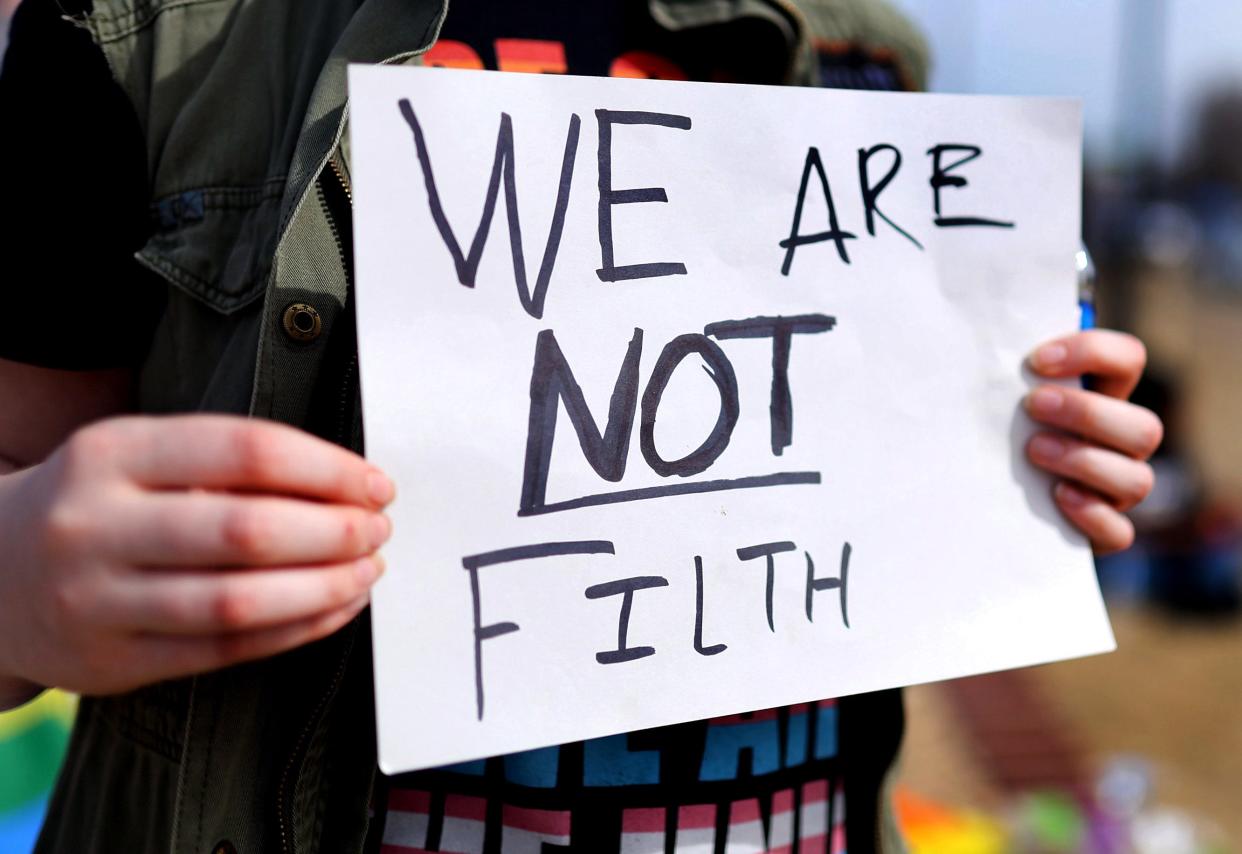US Department of Ed begins probe into gender-based harassment at Nex Benedict’s school district

OWASSO, Okla. — The U.S. Department of Education is investigating an Oklahoma school district after a teenager died the day after a high-school bathroom fight in a case that advocates say highlights the dire consequences of anti-transgender rhetoric.
Acting regional director Karen Mines said in a letter to the Human Rights Campaign, an LGBTQ advocacy group, that the education department’s Office for Civil Rights will examine whether Owasso Public Schools appropriately responded to alleged gender-based harassment of students.
The Human Rights Campaign (HRC) filed a complaint with the department following the death of Nex Benedict, who friends said was bullied over their gender identity.
“We appreciate the Department of Education responding to our complaint and opening an investigation – we need them to act urgently so there can be justice for Nex, and so that all students at Owasso High School and every school in Oklahoma can be safe from bullying, harassment, and discrimination,” HRC president Kelley Robinson said.
Owasso school officials disputed the claims on Friday.
"The district is committed to cooperating with federal officials and believes the complaint submitted by HRC is not supported by the facts and is without merit," said Brock Crawford, a spokesman for the Owasso school district.
Questions surrounding the final hours of the 16-year-old’s life in this suburban Tulsa city have sparked national scrutiny over whether transgender and other LGBTQ children in Oklahoma are protected from bullying at school.
Owasso High School student Benedict died one day after an altercation inside a school bathroom earlier this month. Friends said Benedict, who used they/them pronouns, was bullied over their gender identity, which was different from their gender assigned at birth. Investigators are interviewing other students involved in the bathroom fight to determine whether Benedict was targeted in an act of gender-based violence.
Police have said Benedict did not die as a result of traumatic injuries, citing initial autopsy results. Exactly what killed the teen remains unknown, nearly four weeks after the death.
For many across the United States – as demonstrated by a flood of social media posts – the teen’s death symbolizes the dire consequences of anti-transgender rhetoric and laws promulgated by conservative elected officials in Oklahoma and other states.

In Oklahoma, a law passed in 2022 requires students to use restrooms that match the sex listed on their birth certificates. Critics fear a new proposal making its way through the state legislature could ban discussions about gender identities and sexuality entirely from schools. The state’s top schools official, Superintendent Ryan Walters, has called gender fluidity “the most radical concept we’ve ever come across in K-12 education.”
What happened to Nex Benedict?
Benedict and other students were stacking chairs after lunch on Feb. 7 before the altercation occurred, police and school officials say. Security camera footage shows Benedict walking into and out of a bathroom next to the cafeteria about the same time as several other students.
Benedict later told a school resource officer a group of girls they did not know had been antagonizing them and their friends because of the way they dress and laugh.
“So I went up there and I poured water on them, and then all three of them came at me,” Benedict said, explaining the water came from a water bottle. Benedict said the girls pounced and were beating them up when Benedict blacked out.
After the fight, Benedict's grandmother Sue took the teen to a hospital, where the school resource officer interviewed Benedict.
As Benedict lay in the hospital bed, the officer explained Benedict could also be facing assault charges because the teen squirted the other students with water. Benedict was later released from the hospital.
The next day, Sue Benedict called 911 to report the teenager was having trouble breathing. Nex Benedict died soon after.
The school the next day confirmed a student died, without disclosing their name or any details about what happened. The announcement gained little notice except from a few local news outlets that noted a student had died.
Days later, 2 News in Tulsa reported a fight had preceded Benedict's death. The story went viral after it was picked up by a LGBTQ+ news blog in Pennsylvania on Feb. 16. Police decided to release the body and security camera footage to try to tame the swell of online misinformation, said Lt. Nick Boatman, a spokesman for Owasso police.
But confusion and secrecy cloaking other details — such as exactly how many students are under investigation — have continued to fuel widespread skepticism.
School spokesperson Jordan Korphage would not say whether administrators were aware of any past instances of Benedict being bullied and, if so, what they had done to address the issue.
'I was bullied pretty much every day, consistently'
The groundswell of attention on Benedict’s life and death has shined a bright light on Owasso and its public high school, where nearly 3,000 students attend classes. The city of about 40,000 residents has quickly transformed from a town with a few stop signs to a commuter hub that is a 15-minute drive north of Tulsa.
Several former and current Owasso students told The Oklahoman, part of the USA TODAY Network, that they recognized their own experiences in Benedict’s story. They described instances of repeated bullying and harassment over their gender identities and sexualities and said they often felt administrators failed to appropriately intervene.
“I was bullied pretty much every day, consistently,” said Ren Stolas, 20, who is transgender. “That’s why this hurts a little extra.”

Aren Deakins, who graduated from Owasso in 2018, said other students once cornered him and asked him to show his genitals. Deakins is queer and uses the pronouns he and it.
“I was not a threat, but I felt threatened,” he said, “and the school’s response was I could change lunch” times.
Landon Wood said he felt Owasso school officials did little to protect him when he attended the school as a sophomore in 2018. Wood, 24, is transgender. He attended several public high schools in northeast Oklahoma and said his treatment at Owasso stands out as the worst.
He said he was once questioned by other students over the bathroom he was using. School administrators did not take steps to make sure teachers used his correct name, he said.
“You lose your privacy,” he said. “You never really get to let go of the person you were.”

Yet others who live in Owasso don’t see the reckoning after Nex’s death as a hometown issue. They believe the furor will go away when a new cause takes hold on social media. Dozens of locals showed up at a recent rally in honor of Nex, not to join the demonstration but to watch it unfold from their cars and pickups. Some longtime residents believe the outrage has been manufactured by out-of-state advocacy groups that have seized on the tragedy of a child dying to spin a false narrative.
“It’s the people from other towns that are coming in,” Judy Jimison, a clerk at one downtown shop, said of the outrage.
School administrators have issued statements expressing their condolences and making it clear they do not tolerate bullying.
No one representing the school spoke at a downtown candlelight vigil for Benedict, which drew a few hundred people. A makeshift memorial for Benedict on school grounds was mostly taken down in less than a day, though it's not clear by whom.
Brock Crawford, a school spokesman, did not speak directly to the experiences Wood, Deakins and other students described, but he said every report of bullying is investigated by the school. "As a district, the safety and security of our students is our top priority, and we are committed to fostering a safe and inclusive environment for everyone," he said in an email. "Bullying in any form is unacceptable."
Crawford declined to say whether school officials had implemented any new anti-bullying measures in response to Benedict’s death. He said administrators go over the school's anti-bullying policy with students at the start of every year and tell them how to report bullying.
But Juan Pablo Alvarez, a 17-year-old senior, said teachers and administrators rarely talk about bullying in class or in morning announcements. “Honestly, I just wish they’d talk about bullying more, because it’s a prominent issue,” he said.
Nex Benedict remembered for sense of humor, love of nature
Friends remember Benedict as fun-spirited and funny. Fiery and strong. Kind and thoughtful. They shared their memories with the crowd gathered at the downtown vigil, talking about how Benedict was guarded but generous with close friends.
Some friends referred to Benedict using the pronouns he and him. Relatives said Benedict also used the pronouns they and them. An obituary published by the family said Benedict, a descendant of the Choctaw Nation, loved nature and cats, particularly their pet Zeus.
In a statement, Sue Benedict acknowledged she was still learning about Benedict's gender identity.
“Please do not judge us as Nex was judged,” said the woman Nex called "Mom." “Please do not bully us for our ignorance on the subject.”
An attorney hired by the Benedict family said they wanted privacy to grieve and did not want to speak further. They plan to conduct their own investigation into the events leading up to the death.
Oklahoma passes laws restricting rights of LGBTQ students
A growing number of anti-trans laws and policies have made it more confusing for children to navigate their rights at school, said Megan Lambert, the legal director for the ACLU in Oklahoma. “They retain the right to equal treatment before the law,” Lambert said. “That holds true regardless of any action of the state Legislature or state board of education.”
In addition to the bathroom ban law, state lawmakers also barred transgender girls and women from participating in female sports teams. Walters has been the loudest supporter for the new laws and policies.
“We’re not going to tolerate the woke Olympics in our schools, left-wing ideologues trying to push in this radical gender theory,” Walters said at a January meeting where the state Board of Education voted to require schools to get the board's approval before changing a student’s gender in official records.
That month he also appointed Chaya Raichik, an online personality who runs the far-right social media account Libs of Tik Tok, onto a state school library advisory board. In 2022, Raichik criticized videos posted to social media by an Owasso High School teacher, who said he was subsequently harassed and resigned from school.
The teacher, Tyler Wrynn, returned to Owasso to speak at the vigil for Nex Benedict. Wrynn said the teen loved to joke “'I’m going to fight you!',” always changing the reason why. One day it was over Wrynn’s sports car. Another day it was over being in Wrynn’s class.
“The world is a little darker because Nex is gone,” Wrynn said.
Contributing: Claire Thornton, USA TODAY
This article originally appeared on Oklahoman: Department of Education probing harassment at Oklahoma school district
Solve the daily Crossword

